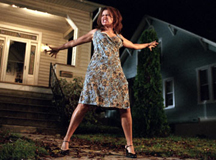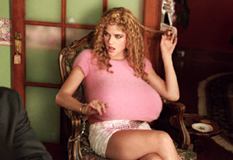|
Newest Reviews:
New Movies -
The Tunnel
V/H/S
The Tall Man
Mama Africa
Detention
Brake
Ted
Tomboy
Brownian Movement
Last Ride
[Rec]³: Genesis
Hara-Kiri: Death of a Samurai
Indie Game: The Movie
Abraham Lincoln: Vampire Hunter
Old Movies -
Touki Bouki: The Journey of the Hyena
Drums Along the Mohawk
The Chase
The Heiress
Show
People
The Strange Affair of Uncle Harry
Pitfall
Driftwood
Miracle Mile
The Great Flamarion
Dark Habits
Archives -
Recap: 2000,
2001, 2002,
2003, 2004
, 2005, 2006,
2007 , 2008
, 2009 ,
2010 , 2011 ,
2012
All reviews alphabetically
All reviews by star rating
All reviews by release year
Masterpieces
Screening Log
Links
FAQ
E-mail me
HOME
| |
A Dirty Shame
(John Waters, 2004)
 A Dirty
Shame is pretty much
the same as any other late John Waters film, which is to say it’s anarchic on
the surface and warm and fuzzy underneath. More than once, while watching it, I
thought of the American Pie movies, which also combined raunch with
sweetness in a way that proved the two weren’t mutually exclusive. Here,
though, the two modes are coming at you simultaneously, so it never feels like
you're being coaxed into liking characters, only to see them humiliated. Even
the most reactionary forces and absurd cultural artifacts on display only seem
to bemuse Waters. It’s as if he’s utterly convinced that everyone, deep down
inside, shares his view of the world, which is surely a reductive perspective,
but at the same time it's a liberating one for a farce to have. When characters
finally own up to their libido, he chuckles at their previous propriety. The
movie uses a lazily incorporated Christ allegory to assault the Religious Right.
In it, sex-addicts, in search of the “carnal rapture” that a heretofore
unperformed sex act will bring, square off against the prudish “neuters”,
who are prone to larger-than-life statements like, “tolerance went too far,
and we all know it!” By focusing his entire plot on sexual addiction (which is
certainly a constant theme in his work), he is perhaps forcing himself into a
thematic box, but the unceasing procession of gags he invents is diverting
enough that the lack of further topicality only occurs as an afterthought.
A Dirty
Shame is pretty much
the same as any other late John Waters film, which is to say it’s anarchic on
the surface and warm and fuzzy underneath. More than once, while watching it, I
thought of the American Pie movies, which also combined raunch with
sweetness in a way that proved the two weren’t mutually exclusive. Here,
though, the two modes are coming at you simultaneously, so it never feels like
you're being coaxed into liking characters, only to see them humiliated. Even
the most reactionary forces and absurd cultural artifacts on display only seem
to bemuse Waters. It’s as if he’s utterly convinced that everyone, deep down
inside, shares his view of the world, which is surely a reductive perspective,
but at the same time it's a liberating one for a farce to have. When characters
finally own up to their libido, he chuckles at their previous propriety. The
movie uses a lazily incorporated Christ allegory to assault the Religious Right.
In it, sex-addicts, in search of the “carnal rapture” that a heretofore
unperformed sex act will bring, square off against the prudish “neuters”,
who are prone to larger-than-life statements like, “tolerance went too far,
and we all know it!” By focusing his entire plot on sexual addiction (which is
certainly a constant theme in his work), he is perhaps forcing himself into a
thematic box, but the unceasing procession of gags he invents is diverting
enough that the lack of further topicality only occurs as an afterthought.
 In A Dirty Shame, Waters employs his
familiar aesthetics in satirizing suburbia by simply challenging its own banal
products to withstand the scrutiny of his camera’s attention. When he shows
things like scrapple, formstone siding, the Hokey-Pokey, or urbanites who refer
to the antics of white trash as “texture”, in their natural habitat he
doesn’t need to embellish much to make a joke. In this respect, Warhol still
seems to be Waters’ prime influence, which results in an undeniable datedness.
With the right attitude, however, that datedness could simply just feel
“retro”, since Waters purposely utilizes outmoded novelty songs, attitudes
that seem hilariously quaint, and filmmaking techniques that often mine laughs
out of their archaic nature (the “subliminal” W-H-O-R-E flashing on the
screen, for example). It’s fairly obvious that on some level Waters is still
rebelling against a time when he himself must have felt repressed by the society
that surrounded him. He’s not so much tracing the roots of current social
discontents as he’s dredging up old ones, laughing at them, and setting them
to rest. Still, there are times
when one wishes Waters were a bit more with the times. After all, it's odd that
in a film about the perceived perversion of suburbia, race never becomes an
issue. As in most of his movies, too many subplots gum up the works of A Dirty Shame a bit. The third act is a mess, dominated by a
desperate FX spree, although it still remains funny. The NC-17 rating is a bit
unwarranted, given what gets by in movies like American Pie.
In A Dirty Shame, Waters employs his
familiar aesthetics in satirizing suburbia by simply challenging its own banal
products to withstand the scrutiny of his camera’s attention. When he shows
things like scrapple, formstone siding, the Hokey-Pokey, or urbanites who refer
to the antics of white trash as “texture”, in their natural habitat he
doesn’t need to embellish much to make a joke. In this respect, Warhol still
seems to be Waters’ prime influence, which results in an undeniable datedness.
With the right attitude, however, that datedness could simply just feel
“retro”, since Waters purposely utilizes outmoded novelty songs, attitudes
that seem hilariously quaint, and filmmaking techniques that often mine laughs
out of their archaic nature (the “subliminal” W-H-O-R-E flashing on the
screen, for example). It’s fairly obvious that on some level Waters is still
rebelling against a time when he himself must have felt repressed by the society
that surrounded him. He’s not so much tracing the roots of current social
discontents as he’s dredging up old ones, laughing at them, and setting them
to rest. Still, there are times
when one wishes Waters were a bit more with the times. After all, it's odd that
in a film about the perceived perversion of suburbia, race never becomes an
issue. As in most of his movies, too many subplots gum up the works of A Dirty Shame a bit. The third act is a mess, dominated by a
desperate FX spree, although it still remains funny. The NC-17 rating is a bit
unwarranted, given what gets by in movies like American Pie.
66
Jeremy Heilman
08/11/04
|